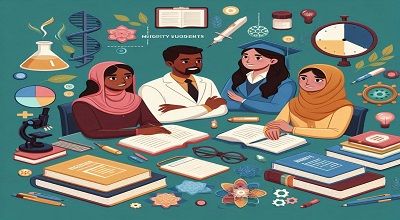Minority students pursuing doctoral programs
Minority students pursuing doctoral programs may encounter unique challenges and barriers during their academic journey. Fortunately, numerous resources and support systems are available to help them succeed. Here are some resources and strategies that minority doctoral students can explore:
- University Offices of Diversity and Inclusion: Most universities have offices or centers dedicated to promoting diversity and inclusion on campus. These offices often provide support, resources, and advocacy for minority students. Reach out to your university’s diversity office for information and assistance.
- Financial Aid and Scholarships: Many organizations and foundations offer scholarships and financial aid specifically for minority doctoral students. These can help alleviate the financial burden of pursuing a doctoral degree. Some examples include the United Negro College Fund (UNCF), Hispanic Scholarship Fund, and the American Indian Graduate Center.
- Mentorship Programs: Seek out mentorship programs that connect minority graduate students with experienced faculty or professionals in their field. These mentors can provide guidance, support, and advice throughout your doctoral journey.
- Graduate Student Associations: Joining or forming graduate student associations focused on underrepresented minority groups can provide a sense of community and networking opportunities. These groups often organize events, workshops, and resources tailored to minority students.
- Cultural Centers: Many universities have cultural centers or affinity groups that offer a sense of belonging and cultural support. These centers often host events and workshops and provide resources to help minority students thrive.
Read more…
- Professional Development Workshops: Look for workshops and seminars that focus on professional development, research skills, and academic success. These can help you develop the skills needed to excel in your doctoral program.
- Academic Support Services: Utilize academic support services provided by your university, such as writing centers, tutoring programs, and time management workshops, to enhance your academic skills.
- Research Grants and Funding: Explore research grants and funding opportunities specifically designed for minority researchers. Organizations like the National Institutes of Health (NIH) and the National Science Foundation (NSF) have programs to increase diversity in research.
- Conferences and Networking: Attend conferences, seminars, and networking events relevant to your field. Building a professional network can open doors to collaboration and career opportunities.
- Counseling and Mental Health Services: Don’t hesitate to seek counseling or mental health services if you encounter stress or mental health challenges during your doctoral journey. Many universities offer these services to students.
- Online Communities: Join online communities, forums, and social media groups that cater to minority graduate students. These spaces can provide a supportive environment and valuable advice.
- Advocacy Groups: Explore national and regional advocacy groups dedicated to advancing the interests of minority students in higher education, such as the National Association for Minority and Women-Owned Law Firms (NAMWOLF) or the National Association for the Advancement of Colored People (NAACP).
Final Words
Finally, your university’s academic advisors and faculty members can also be valuable sources of information and support. Don’t hesitate to reach out to them for guidance and assistance. Additionally, persistence, resilience, and a strong support network of peers, mentors, and allies are key factors in overcoming challenges and succeeding in your doctoral program as a minority student.
